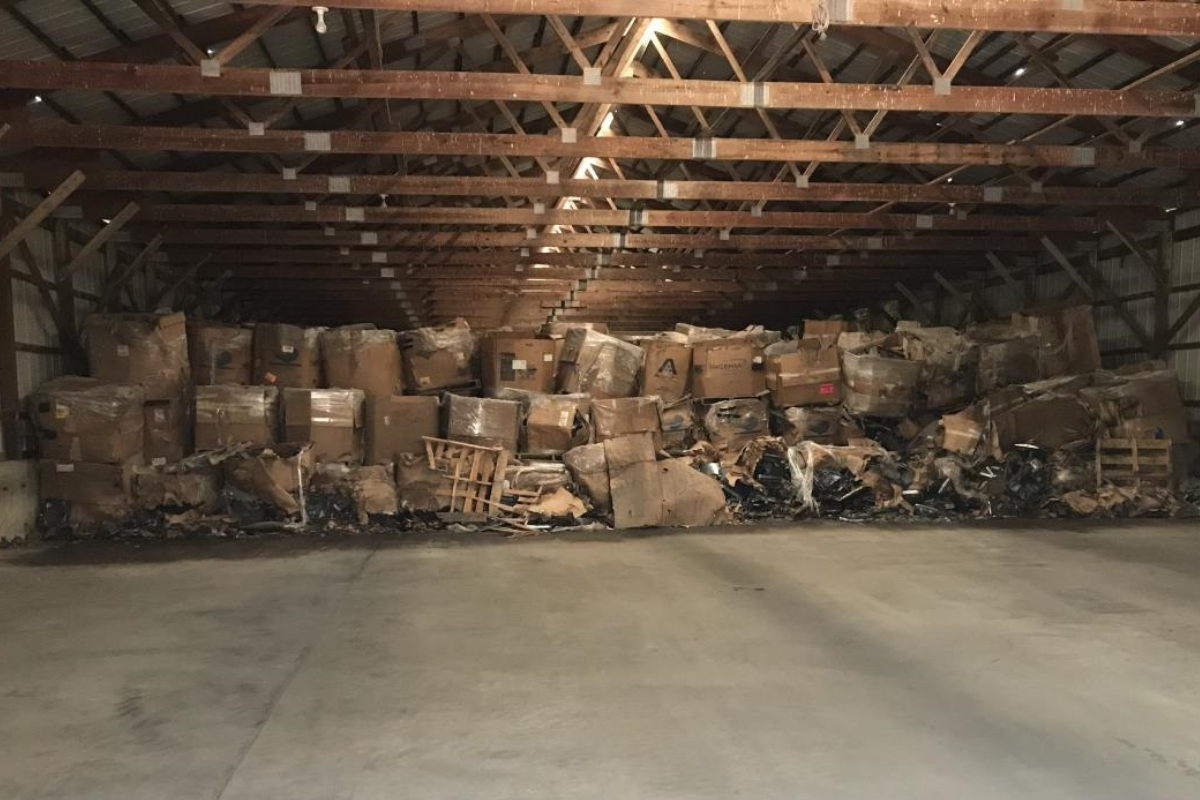
The Recycletronics stockpile in Akron, Iowa was cleaned up in 2022, and the U.S. EPA is seeking to recover costs from companies that allegedly supplied CRTs to the site. | Photo courtesy U.S. EPA
Five recycling companies have agreed to pay relatively small sums to the U.S. EPA to settle claims that they supplied minor quantities of cathode ray tube materials to failed processor Recycletronics, which abandoned stockpiles throughout Iowa and Nebraska.
The EPA in June posted notice of a proposed agreement settling the agency’s claims that Allied Plastics, Cascade Asset Management, OmniSource, Schupan & Sons and URT were responsible for a combined total of 6,860 pounds of CRT materials found at a rural stockpile in Akron, Iowa.
The site was formerly operated by Recycletronics, a Sioux City-headquartered company that attracted the attention of regulators about a decade ago for a number of CRT-related concerns, including improper storage and failure to move material downstream.
At the Akron site, Recycletronics ultimately abandoned 1.9 million pounds of CRT materials, which were removed under EPA’s oversight in 2022 at a total cost of more than $1.3 million. Earlier this year, EPA initiated larger cost recovery proceedings against processor Dynamic Lifecycle Innovations and nationwide hauler WM, alleging that more than 1,400 gaylord boxes of CRT materials found at the site bore labels from one of those companies.
The latest action covers a far smaller portion of material, which EPA terms a “de minimis” volume. Together, the five named companies allegedly contributed less than 1% of the material found at the Akron site. As such, the settlement payments are fairly small, totaling $1,782 for Allied Plastics; $1,584 for both URT and OmniSource; and $990 for both Schupan and Cascade.
All five companies signed the settlements in May and June. Importantly, the settlement states that by signing, the companies do not admit any liability and retain the right to deny the EPA’s findings in the case.
E-Scrap News contacted the five companies for comment and heard back from Cascade and URT by press time.
Cascade CEO Neil Peters-Michaud pointed to a recent write-up by the company detailing how it came to be connected with the Recycletronics site. Cascade learned from the EPA that a label it generated for CRTs in 2009 was found at the Recycletronics site, even though Cascade was working with a separate downstream processor that confirmed it processed the CRTs for that label.
“The reason Cascade’s label showed up at the (Recycletronics) site is because our recycler admitted to not removing the label before they shipped out the empty gaylord for other recyclers to reuse,” Cascade wrote. “It is a common practice in the industry to reuse shipping containers and there can often be labels or imprints left on boxes from previous uses. Our recycler has taken responsibility for the mishap and knows that any labels from Cascade need to be removed from containers once the equipment inside has been processed.”
Cascade found the $990 fee to be a minimal cost to settle the case, and the company noted it has already been reimbursed by its recycling partner that admitted to the gaylord reuse mistake.
Ken Thomas, president of URT, emphasized that his company has never conducted any business with Recycletronics either as an upstream supplier or a downstream processor. URT has long been a prominent downstream outlet for CRT glass, which the company processes for sale into ceramic tile markets.
Thomas wrote that three gaylord boxes found at the Recycletronics site were labeled “CRT Processing,” which is URT’s former company name. But the company was listed under “ship to,” not “ship from,” Thomas added, suggesting the labels on the boxes were connected to shipments that went to URT at one point, not that originated from URT.
Thomas pointed to the same likely culprit as Cascade: Reuse of gaylord boxes, which both companies noted is a common industry practice.
“These boxes were likely emptied at a URT facility, then reused by another customer—without the original shipping labels being removed—and ultimately ended up at Recycletronics,” Thomas wrote.
Thomas wrote that on the advice of legal counsel, URT agreed to the de minimis settlement solely to protect the company from legal action from other parties, such as other companies facing liability costs for contributing CRTs to the site.
The EPA posted notice of the settlement agreement at the end of June and accepted public comments through July 28.
It received one anonymous comment, which recommended that “the polluters pay the full cost of the damages and clean up. It is waste, fraud, and abuse for the American taxpayer to pay for cleaning up polluter’s messes, damages, that are expensive and caused by deregulation and corrupt businesses. The government has to stop bailing out polluters, and fraudsters with American tax dollars.”